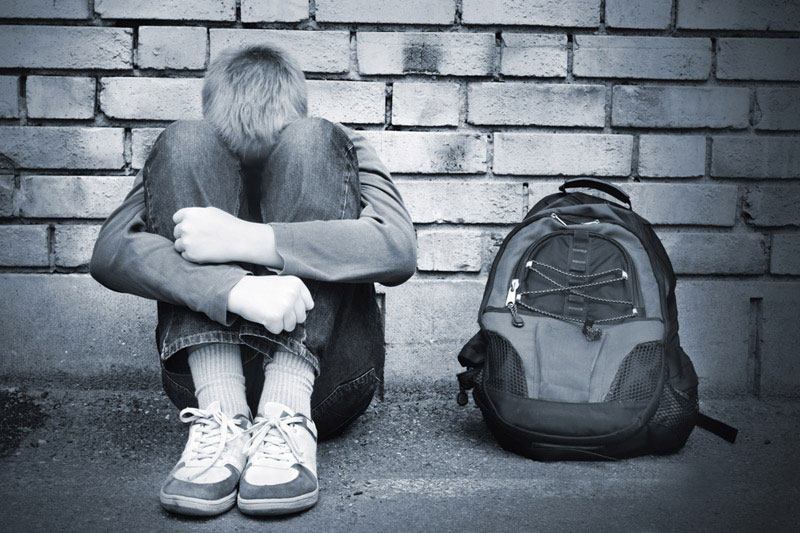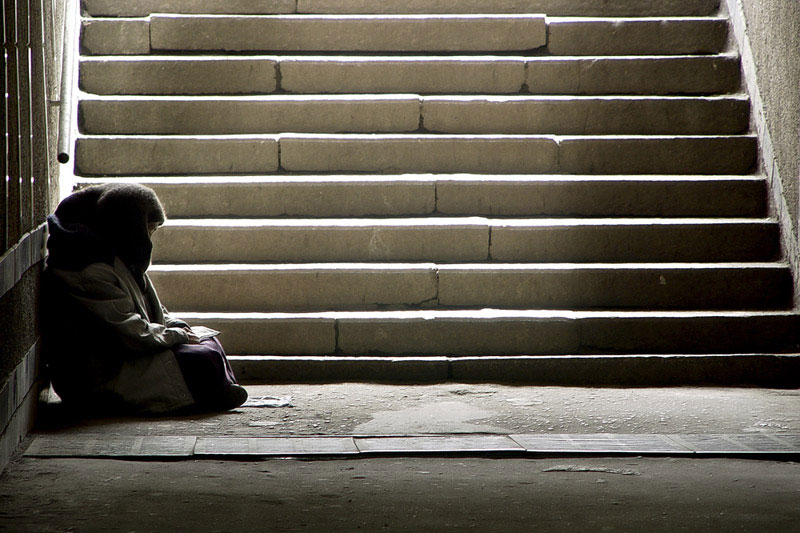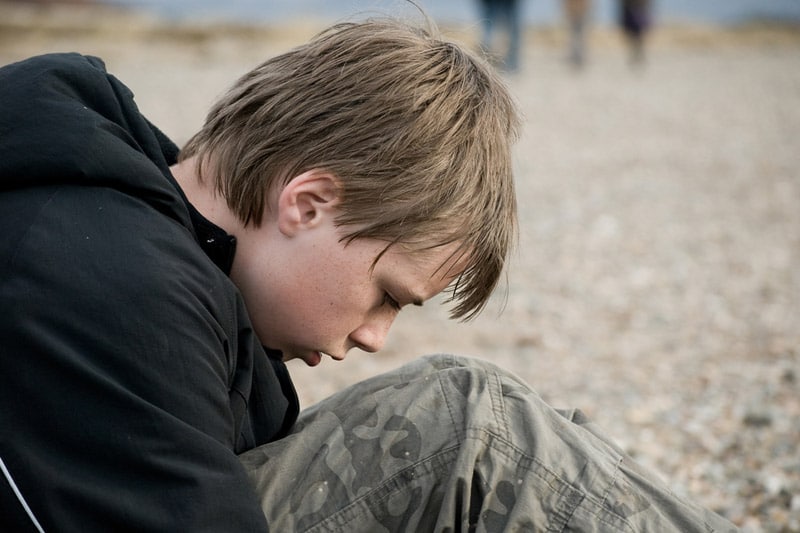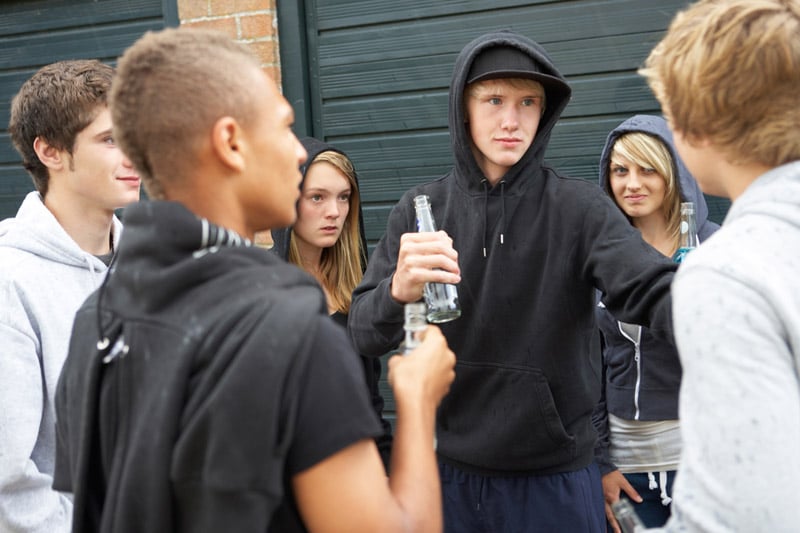
Have you ever been bullied before, whether as a kid, teenager, or adult?
What did you do about the bullying situation? Did you let it go? Did you stand up for yourself? Did you suffer in silence? Did you seek help from others?
This is an important, 6,900-word guide on bullying and how to handle it.
Bullying
What constitutes bullying? Here’s what Wikipedia has to say:
Bullying is a form of aggressive behavior, which may manifest as abusive treatment, the use of force or coercion to affect others, particularly when habitual and involving an imbalance of power. It may involve verbal harassment, physical assault or coercion and may be directed persistently towards particular victims, perhaps on grounds of race, religion, gender, sexuality, or ability.
The “imbalance of power” may be social power and/or physical power. The victim of bullying is sometimes referred to as a “target”.
Bullying consists of three basic types of abuse – emotional, verbal, and physical. It typically involves subtle methods of coercion such as intimidation.
There are various contexts where bullying behavior can manifest. Some examples:
- Relationships – From one partner to another partner.
- Household – From one spouse to another spouse; From parent to child; From guardian to child; From child/parent to grandparents; From landlords to tenants.
- School – From the seniors to the juniors; From the “in” crowd to the “out” crowd; From more popular, well-regarded students to less popular ones; From teachers to students.
- Friends – In high school cliques, there’s usually a “leader” within the clique. This leader may abuse the power and bully the new or lesser members of the clique.
- Workplace – From a manager to an employee; In a work team towards a newcomer.
- Prison – From police to inmates; From one inmate to another.
In each bullying situation, there are two parties involved — the bully, and the victim. For bullying to take place, there has first to be (a) an imbalance in power (b) abuse of that power, which subsequently results in the infliction of pain on the victim, whether emotional or physical.
My Encounter with Bullying
The passage below was written in November 2011.
Last week, I traveled from the UK to the US for a conference. When I was at the immigration counter, I experienced treatment which I have not faced since I was a kid. In fact, I would categorize what happened as bullying.
As some of you may know, I was recently invited to present at the Wharton conference, in Philadelphia. Since this would be my first time in the states, I decide to make the best out of my trip and stay on for three months (88 days, really), so I could experience the US in its entirety.
As a Singaporean, I am eligible to stay in US for 90 days or below without a visa, for either tourism or business purposes, under the Visa Waiver Program (VWP). This is provided that eligibility requirements are met. For all intents and purposes of this trip, I meet the requirements.
Even though I was upfront about my 88-day long trip, I was deemed as a suspicious entrant, which is fine since I reckon it’s probably uncommon for visitors to stay that long. So the officers from Customs and Border Protection (CBP) called me into a private room for further questioning.
Update: Reader Alireza has informed me that the officers in question are from Customs and Border Protection (CBP) and not Transportation Security Administration (TSA). He shared a helpful guide on how to differentiate between CBP and TSA:
TSA are not police (or, as Americans like to call them, law enforcement officers), rather they are civilian employees tasked with doing airport security screening (x-raying bags, operating metal detectors, operating those disgusting machines that radiate people while looking through their clothes).
CBP are a federal police organization that is tasked with immigration and customs activities. The CBP have significantly more (though not absolutely limitless) power than the TSA (who can basically just waste your time). Indeed, they have more power in their little realm than just about any police group in the US.
An easy way to tell between them is where they are. If at the airport security line, its the TSA. If in immigration/customs halls, its CBP. Also, TSA have more of a “true” blue uniform, while CBP uses a midnight color.
However, this was when things went downhill. It would be almost an hour before I was let out.
Inside the CBP Office
It first started with casual questions, where the officer fired me a series of standard questions, like how long I was planning to stay in the US, what I was doing there, why I was planning to stay for so long, who I was going to stay with, how I knew the person, how long I knew the person, what the person’s name was, and so on.
The attitude was not exactly amiable, but tolerable.
The first incivility took place when the officer wanted to know the telephone number of the person I was staying with in the US. As I had it on paper, I reached into my bag and took out my stack of documents to look for it.
Before I could do anything further though, the officer, instead of taking down the number he had asked for, reached his hand across the table, snatched the documents forcefully out of my hands, and started looking through them, one by one — without asking me for permission.
None of the documents were meant for the officer, save for the one where I had printed my friend’s details on. Not only did he ignore my protest to stop browsing through the papers, but he went right into a string of questions about its content, which was incredibly invasive.
Bizarre Accusations
Because some of the papers were of the Wharton conference which I was attending (which is some one-day conference), the officer, somehow, without any link, basis, or logic, concluded that I was planning to stay in US for good. He also concluded I was planning to set up my business there. Except that I wasn’t:
- I only planned to stay in the States for 88 days. I already had a return ticket booked in early Feb (departing from Philadelphia to outside America), 88 days from the point of my entry in US. I had no intentions to stay in US beyond 90 days, because it is not legally allowed and I am a law-abiding citizen.
- The key objectives of my trip would be to: (a) experience the US (b) make new friends and connections — just like what I had been doing in Europe prior to my US visit. I would also be speaking at a conference, for one day out of the 88 days I would be there. These objectives are in line with what is outlined in VWP, which waives the need for a visa for a trip that’s for tourism or business purpose, if it’s lesser than 90 days.
- Under the VWP, I wouldn’t need a visa for my trip. I have to meet the eligibility requirements to qualify for the waiver, which I do.
What ensued was a series of absolutely bizarre interrogation and accusations:
- I was erroneously accused of intending to set up my business in US and to stay in US beyond three months in my trip, despite my attempts to explain otherwise. They refused to acknowledge my departure ticket as evidence (booked 88 days from my point of entry into US) because to quote them, “flights can be changed.”
- I was repeatedly threatened to be charged with fraud unless I told the “truth” (even though I was already telling the truth).
- My luggage, handbags, laptop bag, wallet, papers, and name cards were seized and searched. They saw and looked through all my clothes, personal belongings, etc. in my luggage.
- My mobile phone was confiscated and the private messages inside my phone were looked through without my permission. People on my contact list were also contacted/called without permission.
- I was repeatedly told by the officer to “admit” that I was going to stay in the US beyond three months and that I was going to set up my business there (even though this was not the truth), else I would be charged with fraud, deported back to Singapore right away and permanently barred from ever entering the States.
- I was, on numerous occasions, cut off in my attempts to explain myself. In one of my attempts to speak, a female officer cut me off with this: “Look, LISTEN. I’ve been doing this for YEARS. I know when people are coming to live in America and when people aren’t. You ARE coming to LIVE here. You better tell the truth or it’s going to be a lot worse for you.” (Ironically she was absolutely wrong, so I don’t know if she should be relooking into her own experience/biases as a CBP. The sad part about this is that it’s a woman saying to another woman, when I was hoping that she, as a lady, could be more civil than how her male colleague was treating/ill-treating me.)
- I was repeatedly accused of lying despite what I said. (Which I consider highly slanderous because my entire career and life is based on honesty and truth.)
- I was perfectly polite and compliant throughout the whole exchange, while their attitude towards me was extremely abrasive, rude, and hostile. Once again, they were very accusatory and slanderous in the entire exchange.
State of Powerlessness
For the first time in my life, I felt like a prisoner. Suddenly I felt I was transported to an alternate universe where personal rights or basic civility did not exist.
I still remember my hands and knees were shaking inside the booth towards the later half of the interrogation, even though I was overall calm, composed, and holding my own despite the threats. While I looked like I was unfazed, I was terrified on the inside.
When I questioned myself on why I was shaking, I realized it was because I felt powerless.
- While basic civility and personal rights was a given in the modern society we live in, this did not apply behind the closed doors, inside the booth. I could not rely on the standard behavioral norms in my interactions with them. The things they said and their behavior toward me were out of line when compared against what’s considered normal, civil behavior. I basically felt like I wasn’t a human, like I was some sub-human in the whole encounter.
- I had an agenda laid out before me for the next three months — to speak at the conference, to travel and experience new cities and cultures, to meet new people and make new connections. These were important to me. However it seemed like they could easily wipe away all of that at their whim. They repeatedly threatened to deny me entry and deport me back to Singapore, despite the fact that there was no concrete evidence to support their claims. As authorities with power invested in them by the government and people, it felt they were misusing their power. (Whether they were really able to do that is a different matter altogether)
- I have been a law-abiding citizen (of the world) all my life, and will continue to be. To suddenly be accused of fraud and threatened to be incriminated with fraud when I had committed nothing of the sort, by people who were supposedly representatives of the law and supposed to use the power they were vested with to help fellow world citizens including me, was shocking.
- There appeared to be no objective checklist behind the incrimination claims. The accusation of fraud, and threats to incriminate me with fraud, seemed to spring from highly subjective evaluation, whereby the evaluation was by them.
- Despite what I did or said, I was disregarded. At the crux of the interrogation, it was my word against theirs, and because they were official authorities and were legally recognized to have more power over me, anyone else could have listened to their words and took what they said over what I was trying to say.
After what seemed like ages (almost an hour, give or take), I was finally released after my friends were individually contacted and were able to verify my story.
At the end of it all, the officer begrudging stamped my passport, flippantly passed it back to me, with a disgruntled “Have a nice day” without bothering to look at me in the eye.
There was no apology given for the poor treatment and false accusations that took place in that one hour. It almost felt like they could do whatever they wanted to do and get away with it, because they were the official authorities, with power vested by the state.
Aftermath: Reflecting On What Happened

After the encounter, I was bumped out. My first day (and first time) in the States, and I was on the receiving end of poor, condescending treatment. I was not even at my destination yet (it was a stopover), and I had sat through a long eight and a half hour flight prior to that. It was definitely not a pleasant situation to be in.
As I hung out at a cafe while waiting for my next flight, I thought over the encounter and tried to make sense of it. I realized that my biggest discomfort with what happened was:
- There was an imbalance of power. As the immigration authorities, they had the power to deny me entry, at their discretion. I had no say in the matter.
- The power was abused with the repeated threats, false accusations and poor mannered treatment. It didn’t matter what I said or did; it was disregarded. They only wanted to hear me “confess” to X, when the problem was I did not even do X.
- My rights as an individual was not respected. They were looking into my private possessions without permission, i.e. my mobile phone, my private messages, and my personal documents. They also searched my luggage, handbags, laptop bag, and wallet without permission.
- There was no objective fulcrum I could rely on. The encounter was entirely subjective. It was their insistence against my words. Even objective facts like my proof of my business registration (which is based in Singapore) and my departure flight (88 days from my point of entry) were disregarded. Nothing I said mattered to them.
It was disappointing. Certainly, there was no need for them to use their authority to bully me? I would have gladly cooperated regardless of what they said – and I was already openly compliant from the very beginning of the exchange.
While I have never been held at the booth at the Singapore Immigration nor do I have any non-Singaporean friends caught in the situation before, I’m very sure the Singapore Immigration Authorities would never render such treatment to a foreigner here. I was extremely disappointed in the US immigrations for the way they had treated me, an eager and first-time tourist, of the country. There was not even anger; just disappointment.
It had been a while since I felt trapped, powerless and helpless the way I did. The last time I felt this way was when I was very young, about six to seven years old, when this boy in my neighborhood would extort candy from me. It eventually ended after a couple of months, when my mom interrupted one of the exchanges, by accident.
Ever since then, I never had to face situations where the other party had power over me. At least, not situations I couldn’t already manage. If I ever encountered such situations, I would either (a) find ways to empower myself over the bully (b) strategically tackle the situation or (c) exit the situation. Obviously it was different in my encounter with the CBP — none of the methods were applicable.
Bullying: How Can We Handle It?
So how can we handle bullying?
Dynamics of Bullying: Understanding the Bully and Target
Bullying is a oppressive situation to be in – one that results in fear, trepidation, anxiety, or even shame.
For the bully, he/she comes from a very low consciousness level. He/she knows he/she has power over the target (whether physical or social), and he/she uses that power to get what he/she wants from the target. It’s a low consciousness act because it relies on force to achieve the outcome. (Force here does not necessarily mean physical force, though it can be. Force refers to any action that’s rooted in fear rather than love.)
For the target, he/she experiences fear due to the encounter. Bullies induce their targets into low consciousness levels such as fear, grief, guilt, or even shame, in order to extract their desired outcome. The tactics they use can include manipulation, coercion, humiliation, or even abuse.
For example in my situation, the CBP threatened to charge me with fraud, deport me back to my home country and permanently bar me from ever entering the States, unless I said what they perceived to be the truth (even though it wasn’t the truth). This is an coercive act, because they were oppressing me to do something via threatening me with an alternative, worse-off scenario they could do by way of their authority. There was no neutral agent to objectify or mediate between either of our claims.
Implications of Bullying
Targets of bullying often face deep rooted trauma from the bullying which lasts long after the bullying incident is over.
This trauma can exist in the conscious state, where the victim lives in fear every day, even though he/she is no longer in any physical danger.
This trauma can also be embedded subconsciously, where the victim is affected by the incident without being aware of it. The emotional trauma may manifest itself from time to time in dreams, sudden flashes, self-debilitating thoughts, or sudden emotional surges.
Addressing Bullying
I’m not sure if there is a perfect solution to tackle bullying, because each situation is different and the dynamics vary a lot across situations. There may well be bullying situations that are impossible to get out of, simply because the bully has physical power over the target.
For example, kidnapping and abuse cases where the victim is locked up with no means to escape. Or in my case, where the bullies in question were government authorities and there was nothing I could do but hold my ground and let the situation play itself out.
These are more exceptions to the rule though. For most bully situations, we do have the power to turn them around, even though it may not seem so at first sight. We can change the outcome of the encounters based on how we react. By not letting ourselves be victims, the bullies will have no power over us.
How to Handle Bullying: An Important Guide

If you are currently a victim of a bullying situation, I hope you take heed to what I have to share in this guide, and apply them to your situation so you can get out of it. If you aren’t but you know someone who might be, please share this guide with them. If this topic doesn’t apply to you, read it any way, because you never know when the steps may come in handy.
Here goes:
1. Be calm. Don’t panic
The bully gains power by instilling fear in the target. By panicking, you would be giving the bully the power to intimidate you.
While it’s easy to tell others to be calm, how can one actually remain calm in such a situation? Three things to recognize:
- Recognize that despite the social or physical power the bully may have over you, you do have some power over the bully. If you don’t, the bully wouldn’t have picked on you as the target. He/she wouldn’t have to resort to bullying either. The reason why he/she has to bully you is because you have power over him/her, which he/she wants to acquire.
- Panicking is a cue to the bully that he/she is doing something right. Firstly, it tells him/her that you can be intimidated and he/she should continue to bully you. Secondly, it tells him/her that whatever he/she is doing is working, and it encourages him/her to continue the bullying. By panicking, you allow the bullying to perpetuate.
- As hard as it is to believe, you can affect the outcome by how you react. Shrinking in fear will cause the situation to turn out dramatically different as compared to if you make strategic interventions during the exchange. Always bear this in mind.
Come think of it, the bullying encounter with CBP resolved itself because I maintained my stand throughout the whole exchange. I did not make a false confession despite the threats; I did not retaliate; neither did I lose my composure. I simply reiterated myself, which was I had no intention to live in the states, I was there mainly as a leisure visit, and I planned to leave before three months was up.
If I had panicked and “confessed” to something I didn’t do just because I was scared of them, the consequences would have been disastrous.
I had a separate encounter with the UK immigration one months ago which descended in poor taste because I retaliated in response to the officer’s poor attitude. Since there was a clear power imbalance, whereby he was an authority and I wasn’t, and since he had no qualms about using the authority to assert himself, he began to make intimidating statements, mainly attacking my position as a foreigner and drawing a divide between me and the British. He would respond in jest no matter what I said.
In the end, I figured out that it didn’t matter what I said. So I just kept quiet and stood through his attacks, after which he began to loosen up after about several minutes of poor conduct. That was when I could get through to him and he began to converse with me somewhat normally then.
(Side note: It seems my background and travel history makes me a suspicious traveler at the customs — being a business owner, able to work anywhere in the world and not needing to be situated at my home country, single, been away from home for an extended length of time, etc. The world is still very much fixated with the notion that one has to have a job that is desk-bound and location-bound, but I believe this will change soon, in the next 3-5 years’ time, as the internet empowers everyone to pursue what they love to do and do it from anywhere in the world.)
Other steps to remain calm:
- Raise your consciousness. As I mentioned above, the bully comes from a low consciousness level, usually fear, guilt or shame. He/she wants to drag you down in your consciousness level. The lower your level, the more likely you are the panic. The higher it is though, the more grounded and more unaffected you will be. Raising your consciousness keeps you out of reach of the low consciousness levels, so you won’t be affected by the fear-based tactics.
- Ground yourself. Like a tree with deep roots into the ground, no one can shake you if you are well grounded. Read Tip #1 of How To Deal With Energy Vampires on how to ground yourself.
- Protect yourself in a bubble. Also known as shielding. Read Tip #2 of How To Deal With Energy Vampires on how to shield yourself.
- Identify the source of fear. At our resting state, we are calm. We panic because there’s a stimulus driving fear in us. If we can drill down to the cause of the fear and unravel that, we can return to our state of calmness. See Tip #10 #below.
2. Size up the situation
The bully is probably picking on you as the target because he/she recognizes he/she has some power over you. Hence, it may not be in your favor to go on the offensive at the start, because it leaves you open and vulnerable. You want to size up the situation first, make an assessment, then consider the best course of action.
Consider:
- Who are you dealing with?
- What is it that he/she wants from you?
- Why is he/she bullying you?
- Is there anything you can do about the bullying?
- Is there anyone you can seek help from?
The questions help you to break down the situation and get clarity on it. The more you understand the situation, the easier it is to tackle it.
3. Don’t give the bully your power
In Tip #1, I mentioned while the bully has power over you, you do have some power over him/her.
As long as you remain calm (Tip #1) and don’t give your power away to the bully (by not surrendering, showing fear or breaking down), you will continue to own that power.
On the other hand, when you give away your power to the bully, he/she will know that he/she can have his/her way with you. It will encourage him/her to continue the bullying because he/she knows you are a ready target. That’s when things will cross the line (if it hasn’t already been crossed), and you don’t want that.
4. Assert your stand
In line with Tip #3, be clear about your rights and boundaries. Assert your rights. Defend them. No one can make you give in if you don’t want to give in.
In asserting yourself, don’t retaliate with threats because it will agitate the bully further. Rather, approach the discussion in a calm manner.
- Let the bully know where you stand. For example, say you are part of a social circle where one of the members keeps making fun of you. Let him/her know: “Look, you have been making fun of me for the past few weeks and I have been tolerating it. But this is becoming too much. I have my rights and I would appreciate it if you can respect it.”
- Reiterate the facts to him/her, if you feel he/she is missing the point. For example, in my CBP encounter, the officer kept accusing me of lying over and over again. For every 1 time the officer accused me of having ulterior motives for my US trip, I would repeat my original answer. For every 1 time he threatened to charge me with fraud, I would repeat the same answer as well. In the end, the officer realized he wasn’t getting anywhere, and went to Plan B where he called the people on my list to verify what I said with them. This was when my story was affirmed to be fact, and I was released after their embarrassing hold up.
- Inform the bully of the consequences if he/she continues treating you in the same manner. For example, if you’re dealing with a school bully, one thing you can say: “This is not acceptable behavior by the school regulations, and we both know it. If you continue doing this, I’m afraid I have to inform the teacher. If you stop this as of now though, I’m willing to let everything go.”
5. Give the bully what he/she wants (if your safety is at stake)

If your safety is at stake, then give what the bully wants. Don’t put up a resistance. For example, mugging attempts or extortions, where the bully threatens to physically harm you if you don’t surrender your physical possessions. Usually I would encourage you to find a way out, but where safety is concerned, it’s better to be safe than sorry.
You can always reacquire whatever you forgo to the bully. Loss of phone? Buy a new one. Loss of money? Just earn more money then. Treat it as a charitable donation to less fortunate people who need it more than you. There’s no need to get hung up over it.
There is a problem, however, if the bullying behavior persists beyond a one-off event. If the bully is a recurring figure in your life, and he/she constantly uses bullying to extort things from you, you want to put a stop to it, because it’s not sustainable. Check out the other tips (#3, 4, #6-10) on how to break the bullying.
6. Walk away from the situation
In most bully situations, we can walk away from it, unless it’s an extreme case like kidnapping or where you’re dealing with legal authorities like what I went through. In these cases, walking away potentially opens up a bigger set of risks, so you want to play it safe and maintain within the boundaries.
In most cases though, we can remove ourselves of our accord – we just think we can’t because the bully has created an emotional stronghold over us.
Ask yourself:
- Why am I staying in this bullying situation? Is it because there are serious implications otherwise, or because I think there would be serious implications as a result?
- What’s the worst thing that will happen if I walk away from this? Will it result in physical danger or any long-term implications?
If your answer to #1 has nothing to do with physical harm, and leaving will not result in any long-term implications, then you should walk away from it.
For example, a relationship partner who coerce you into staying on in the relationship. Your partner does not “own” you – you belong to yourself and you are free to choose whoever you want. You do not have to account to him/her, especially not if this is someone who disrespects your rights and coerce you into doing something against your will.
When I was a small kid, there was a guy in my neighborhood who would extort candy from me (same example I mentioned earlier in the article). I was about 6 or 7, while he was about 9 or 10. He would approach me when I was alone and make me give him all the candy my mom bought for me.
It was all verbal; he never used any physical force on me. I would be shrink in fear whenever he approached me, because he was bigger size and I was afraid he would hurt me. This would happen anywhere from once every couple of weeks to a few times a week.
He told me never to tell anyone about the extortion, and I never did (during the period of extortion). I didn’t dare to tell my mom or (elder) brother about it, even when I was home and theoretically safe from the bully.
Looking back, I should have just walked away from the situation. The only reason why I didn’t walk away was because I thought he would have hurt me, but in retrospect, I seriously doubt he could have done anything to me. There was nothing he had over me, really, other than the fact that he was older and bigger sized. He was nobody to me; I owed him nothing; I had no idea who he was (and come think of it, neither did he actually – he was just always hanging out in the neighborhood and I lived in the area, which was why he could always come up to me) and I had my family to protect me if I ever came into harm’s way.
He had power over me because I gave him that power. Conversely, if I didn’t, he couldn’t have done anything about the situation. (See Tip #3: Don’t give the bully your power)
7. Seek help from others
You may not be able to handle the bully by yourself, and that’s okay, because you don’t have to. You’re not alone in this.
Seek help. One way is to connect with someone who has power over the bully. For example, if you’re in a school bully situation, inform the teachers or the principal. I remember when I was in primary school, there was a male classmate who would often make fun of my dialect name. Other male classmates would do the same too, because he created the space to do so. I subsequently told the teacher about it, who told him off in front of other students. He never tried to do that again. Neither did the other male classmates.
Another example is workplace bullying. Say your colleagues are bullying you because you’re a new member to the team. They pile you with a lot of work, boss you around and refuse to help you out. Obviously, this is not acceptable workplace behavior. You want to connect with your manager, and perhaps their managers, and inform them about it so they can intervene accordingly. You also want to connect yourself with other co-workers and get their support in the workplace.
Another way is to gain strength through numbers. Even if each individual person has no special power over the bully, a group of people gives collective power. For example, if there is someone picking on you in school, then associate yourself with new friends. Make sure you hang out with them, in a group, each time. The bully will realize you are not the “easy” target he/she thinks since you have the support of others, and will soon back off.
8. Appeal to the rationale side of the bully
I like to think that everyone has a conscience. And that no matter what it is they are doing to you now, they have their reasons, even if seemingly unjustified.
See if you can appeal to the rationale side of the bully:
- Understand why the bully is doing this: Why are you doing this?
- Check if you can help: I’d like to help if I can. Is there anything I can do to help?
- Seek a middle ground: I don’t want to this situation to be worse than it already is. Is there an amiable way to resolve this?
9. Use your self-defense weapons (only for the worst case scenario)
To be done only for self-defense, and not to inflict harm on others. For the record, I believe at our highest consciousness, all things can be resolved without violence, but if you’re dealing with someone of extreme low consciousness, it may not be possible to rationalize with him/her. If you feel you might be in physical danger, then it’s good to arm yourself.
Pepper sprays and stun guns are non-lethal self-defense tools which are allowed in some countries. Different countries have different regulations, so check with your local authorities on what’s allowable and what’s not. The last thing I want is for you to get charged for possessing dangerous equipment, because of something you read at Personal Excellence!!!
Use the weapons only in the worst case scenario when you are in danger. Apply all other tips first if you can.
10. Understand (and detach yourself from) the source of fear
To defeat fear, first understand it.
When I was in the interrogation booth, I asked myself why my hands and knees were shaking. I realized it was because my upcoming pursuits were at stake. If I were really denied entry, I wouldn’t be able to speak at the conference, visit the different places in US, or make new, meaningful connections. The situation did seem dire.
I then regained my power by identifying an alternate pursuits if they were truly dashed. What could I do if I wasn’t able to enter US? I would have (a) more time to work on my business, since I wouldn’t be traveling (b) get to return home early and see my friends and family (c) be exposed to opportunities in Singapore/elsewhere I wouldn’t get access to if I was in US.
With this, the original concern was resolved.
The next reason why I was shaking was because I was worried I would be charged with a criminal offense, even though I did not commit anything wrong.
In worst case scenario, I would be wrongly incriminated. It was a terrifying thought.
What would happen though, if I were to get incriminated? I thought.
I would go to jail. I wouldn’t be able to see my family or friends. I would be cut away from the world. I would be given a mark in the society. I would be made an outcast. I would enter a world I have no clue about. I may be abused in jail. My life would go to waste.
So what if that were to happen, though? I thought.
Nothing, really. It may be non-ideal, but they were nothing that would stop me from making a comeback. At most, it would be another obstacle for me to overcome and learn from.
Suddenly, the situation didn’t seem that scary. I’m not saying that I want to be falsely charged with fraud or I’m okay if I were to go to jail (especially not if I didn’t even do anything wrong to begin with), but that the thought of it stopped striking as much fear as it did before. And by loosening the source of fear, it released the hold the bully had over me.
By identifying your fear, understanding the source, and breaking it, you regain your power. When you have nothing to fear, the bully has no hold over you.
Read: 4 Reasons We Should Overcome Fear
11. Call the Police (or Relevant Authorities)
If you think the situation is escalating out of control, call the authorities. Call the police (911). Get the authorities involved. Explain the situation in detail, from the beginning to the end, to them, so they can best help you. Offer all the information required.
Don’t be worried about implicating the bully; the bully crossed the line when he picked you as a target. Something needs to be done to put it to a stop.
My situation is unique in that the bully in question is the authority, but it’s an exception than the rule. It’s unlikely that you’ll be caught in such a situation though, so don’t worry about that.
Last Words
If you’re the target of a bully situation, please don’t suffer in silence. Read this guide carefully, multiple times if you need to, and apply the tips.
You are not brought into this world to suffer. You’re brought to this world for a greater purpose than that. Whatever you’re going through is merely something to help you grow, a lesson for you to learn, a test for you to pass. By addressing it duly, and overcoming the problem, you’ll emerge a stronger person, one who is able to take on greater things.
Personal Travel Update
For those who are curious, I’m currently traveling in US. I just finished my engagement with Wharton last week, and I’ll be traveling to Washington DC today, followed by NYC next week. I may stay in NYC for a couple of weeks, depending how things go. I’ll also check out Boston after I’m done with NYC.
My plans after that are open ended at the moment. One option is I will go to the west coast, possibly including but not limited to: Sedona Arizona, Las Vegas, San Francisco (California), Los Angeles (California), and Seattle.
The other option is I will just return home to Singapore. It’s getting cold, and while I’ve gotten accustomed to living in 10+ degree Celsius, the temperature is in single digits now (Celsius), and I’m freezing my butt off whenever I’m out in the streets! I’m also looking forward to work on my fitness plan when I get back (haven’t exercised much due to my travels and the cold weather), because I want to maintain what I’ve been building since my fast in Feb.
The other, bigger reason is that it’s been already five months since I’m away from home. In the past five months, I’ve been traveling non-stop, moving from place to place, meeting endless number of new people. Some people feel tired after two weeks of travel, so you can imagine this is like traveling on steroids. As of now, I just want to stay put at one spot and enjoy some stability.
I’ve always loved Singapore since the beginning, and the encounters I’ve faced have made me appreciate it even more. While I left Singapore with a potential interest to migrate in the future, I think Singapore is where I want to stay for the time being. The cities I’ve been (London, especially) have been amazing, but all factors in consideration (including difficulty to stay longer beyond allowable length of stay), Singapore is what’s calling out to me for now.
That said, things may change in the future, and I’m open to different possibilities.
For sure, my one encounter with CBP shouldn’t be seen as representative of what life in the US is like (I’ve been meeting a lot of great people, Americans included, since my first week in the States), but it definitely suggests how unwelcoming the foreign climate can be towards non-locals, and how difficult it can be to get authorization if I ever want to live in the states in the future.
I don’t rule out coming back to the States in the future or living there next time, but that will only happen if there is a clear, compelling reason (say, work engagement, visiting friends, checking out new sights, and so on). By myself and as the situation stands, there is no reason for me to return for now. I definitely do not relish the thought of getting interrogated in that manner again, for whatever reason, when I’m not violating the law to begin with.
Update Jan 2012: I’ve since reached Manhattan, New York, and stayed there for 1.5 months. I’m now in west coast (Los Angeles), and will be hanging out in the west coast for my last month in the states before I return to Singapore. :)
(Images: Boy upset, Alone in dark, Upset boy #2, Bullies)









 Thanks for reading. If you like my free articles, join my private email list and get my latest updates and articles sent right to your inbox.
Thanks for reading. If you like my free articles, join my private email list and get my latest updates and articles sent right to your inbox.